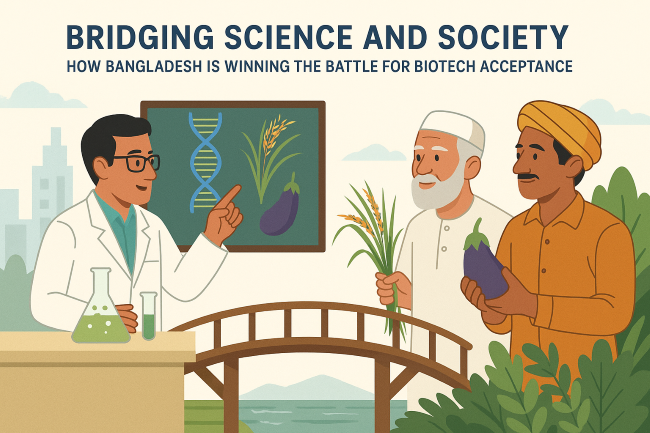In a country where rice and brinjal are everyday staples, a quiet revolution is underway — one that could change not just diets, but destinies. Thanks to strategic communication efforts by scientific leaders like Arif Hossain and Dr. Abdul Momin, Bangladesh is steadily turning the tide on public skepticism toward genetically modified (GM) crops.
At ABNE Biotechnology and Biosafety Global Virtual Study Tour of Brazil, Argentina, India, and Bangladesh, which took place from March 24 to 27, 2025, while Jiban Krishana Biswas, Former Director General of BRRI spoke on “Golden Rice in Bangladesh: History, Present Status & Future”, the Director General of BARI, Abdullah Yousuf Akhond spoke on the “History, Present Status and Future of Biotechnology, Bt Brinjal and LBR Potato.”
However, the CEO of Farming Future Bangladesh (FFB), Arif Hossain, spoke on the “Public Perception and Communication of Bt Brinjal and 3R Gene LBR Potato, while the Senior Communication Officer of BRRI, Abdul Momin, spoke on “Communication and Public Perception of Golden Rice”, which topics my article is centered.
From Golden Rice to Bt Brinjal, the story of biotech acceptance in Bangladesh is a powerful lesson in how evidence, empathy, and engagement can reshape public perception.
Golden rice: A golden opportunity for health
“Fear of GMOs often stems from misinformation,” says Dr. Abdul Momin, Senior Communication Officer at the Bangladesh Rice Research Institute (BRRI). At the Biotechnology and Biosafety Global Virtual Study Tour, Dr. Momin outlined Bangladesh’s communication journey around Golden Rice — a genetically modified rice enriched with provitamin A to combat widespread vitamin A deficiency.
Bangladesh’s efforts mirror a global journey:
- The Philippines embraced Golden Rice after robust safety reviews.
- India stalled under public resistance and regulatory hurdles.
- Bangladesh stands at the crossroads — running field trials, building awareness, and rallying public support.
Dr. Momin emphasized the key communication strategies:
- Simplifying scientific messaging for farmers and consumers.
- Direct engagement through seminars, farmer meetings, and religious leader briefings.
- Strategic media outreach, from FAQs and flyers to social media campaigns.
High-level engagements were crucial: top officials, including the Prime Minister, were regularly briefed on research progress. USAID officials visited trial sites, adding international validation.
Yet challenges persist. Funding gaps, cautious management policies, and social media restrictions have sometimes slowed the momentum. “Despite hurdles, transparency, education, and partnerships between scientists, policymakers, and the public remain essential,” Dr. Momin concluded.
Bt Brinjal and 3R Potato: Turning skepticism into trust
Meanwhile, Arif Hossain, CEO of Farming Future Bangladesh (FFB), has been fighting a parallel battle — building trust around Bt brinjal (eggplant) and the 3R Gene Late Blight Resistant (LBR) Potato.
At the March study tour, titled “Bridging Science & Public Perception”, Arif shared how misinformation had once clouded public understanding of GMOs. “Many people saw GM foods as ‘unnatural’ or risky, despite scientific evidence showing otherwise,” he explained.
To counter this, FFB adopted a three-pronged communication strategy:
- Demystify science — breaking complex ideas into simple, relatable terms.
- Build trust through transparency — openly discussing benefits, risks, and rigorous safety evaluations.
- Foster dialogue — empowering farmers, faith leaders, youth, and journalists to become biotech ambassadors.
Programs like the Faith Leaders Engagement Initiative trained over 500 Imams and 230 Shariah scholars to spread accurate, values-based messages about agricultural biotechnology. Campaigns used storytelling, grassroots dialogues, videos, and even interfaith discussions to reach rural communities.
The results were striking:
- Bt brinjal gained ground among farmers, boosting yields while slashing pesticide use.
- The 3R potato is helping smallholders cut fungicide costs, reduce chemical exposure, and secure better harvests.
“Our vision is simple,” Arif said. “A world where science and innovation are embraced for sustainability, nutrition, and human flourishing.”
The broader lesson: Science alone is not enough
Both Dr. Abdul Momin and Arif Hossain agree: scientific breakthroughs mean little without public trust.
In a world awash with misinformation, the battle for biotech acceptance isn’t fought only in labs — it’s won in fields, mosques, schools, and newsrooms.
Bangladesh’s model shows the way forward:
- Engage early and often.
- Respect people’s fears, but answer them with facts.
- Use trusted community voices to tell the story.
- Make science human, relatable, and empowering.
As Bangladesh edges closer to commercializing Golden Rice and scaling up Bt crops, it reminds the world: when science and society walk together, even the toughest barriers can fall.
Abdallah is a multiple agricultural award winner, Editor-in-Chief of ASHENEWS and President of the Pan African Agricultural Journalists (PAAJ). He can be reached at www.elkurebe@gmail.com


